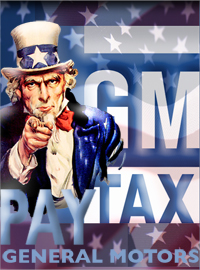| GM Thanks Taxpayers for Bailout by Calling for Tax Hikes |
 |
|
By Ashton Ellis
Wednesday, June 08 2011 |
If you thought the genius who steered General Motors through bankruptcies and bailouts had learned anything about how a prosperous market economy works, think again. In a stunning series of policy prescriptions, CEO Dan Ackerson reveals an almost criminal attempt to make permanent the government’s distortion of the U.S. auto market. Speaking to reporters from The Detroit News recently, Ackerson declared his support for not one, but two tax increases. The first is a defensive maneuver to shift responsibility from automakers to gasoline producers on whom consumers should blame for the coming spike in owning a car. By 2025, federal officials want to increase annual fuel efficiency by 3 percent to 6 percent, or 47 mpg to 62 mpg, which could raise the sticker price of every new car by up to $3,500. But instead of fighting those cost-raising regulations or trying to find a competitive advantage in a more costly industry, Ackerson-the-bailout-chief is calling for consumer-crushing tax increases. He even had the gall to admit that “this will make my Republican friends puke [but] we ought to just slap a 50-cent or a dollar tax on a gallon of gas” in order to force consumers to buy more fuel-efficient cars. Since his “tax everyone” strategy is designed to eliminate consumer choice through de facto fines, Ackerson’s position should make not just Republicans, but everyone puke. How can a man whose company was oh-so-recently 61 percent owned by American taxpayers dare to suggest that as a precondition of General Motor’s continued solvency all drivers must subsidize his company’s lack of cost-conscious innovation? Where is the free-market initiative to make a cleaner car for less money? And talk about polluting the stream of commerce. Under Ackerson’s plan, he can avoid the cost of creating a cleaner car by shifting all of the cost – and blame – to oil and gas companies. By arbitrarily making gasoline excessively more expensive, Ackerson can then swoop to the rescue with fleets of smaller, more fuel-efficient cars. But it’s unclear who will be able to afford those cars if Ackerson’s other disastrous proposal – increasing taxes on the middle and upper classes – comes into being. In Dan Ackerson’s world, what’s good for General Motors is lower revenues for American energy companies and fewer options for American consumers. If Ackerson cared more about growing the American economy than he did about pleasing his liberal shareholders at the Obama Treasury Department or the labor unions, he would be aping Ford Motor Company’s ambitious overhaul. Unlike General Motors, Ford declined to take bailout money from the federal government even though it too was staring at collapse. Instead, Ford changed its business model to become more competitive. It’s working. On Tuesday, Ford’s Chief Financial Officer told the Wall Street Journal that the company is “moving from fixing the fundamentals to growing the business.” The growth will come from selling more of its smaller cars, but not via price gouging Americans with more regulations or higher gas taxes. Instead, Ford plans to increase its overseas sales where smaller cars are in higher demand. Another divergence between General Motors and Ford is the way each company spends money. Ford estimates it will spend $6 billion a year through the middle of this decade on plants and new equipment, up from $3.9 billion in 2010. This will increase the company’s automotive revenue from its current 6.1 percent to between 8 percent and 9 percent a year. Ford’s formula for success is how a company operating in the free market responds to economic reality. By contrast, General Motors’ Ackerson is fretting over how to spend $36.5 billion in cash thanks to massive infusions of capital from private investors and a 26 percent stake by federal taxpayers. Among his options are paying down the company’s debt, funding a financing operation for car buyers and, of course, investing in new products. Looking at Ackerson’s stance on tax increases and his inability to put an enormous amount of cash to good use, one conclusion seems preeminent: the mere presence of federal officials in the ranks of General Motors’ shareholders is distorting any semblance of sound business judgment. Dan Ackerson is living proof of the bad effects of becoming dependent on government. If special treatment for bankruptcy (which penalized bondholders) and billions in taxpayer subsidies (many billions of which will never be repaid) taught him anything, it’s that running a business is much easier when government gives you a competitive edge. For the sake of consumers and the energy supply chain, let’s hope Ackerson’s tenure at General Motors – and federal taxpayers’ involvement – ends as soon as possible. |
Related Articles : |
























